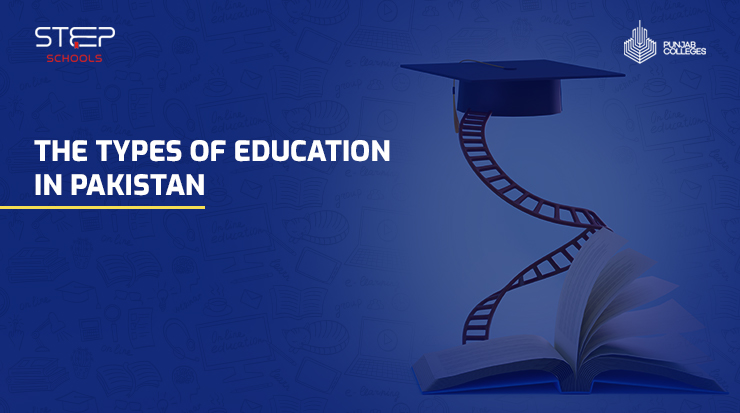Pakistan is a country with rich and diversified culture. However, the basic structure of facilitations is not fully operational. Education is one of the most essential elements for the optimization and growth of any country, and Pakistan is not an exception. In addition, the structure of education in Pakistan is complex and various types and modules are running side by side. This article touches on all the types of education in Pakistan and explains formal education in detail. Furthermore, we tell you how Step Schools is the only school with modern formal education.
- Formal Education
- Informal Education
- Religious Education
- Vocational Education
- Distance Learning
Formal Education in Pakistan
It is the most addressed type of education in Pakistan. It is a fully structured and designed type of academic in Pakistan. There are two different formats of education that are running side by side. Regular Matric board education pattern and the Cambridge education system.
In the matric board examination resides three levels. Primary, middle, and secondary education. Primary education initiates from age five to nine, then goes from age ten to twelfth, leading towards the students aged 13-16 in the secondary classes of ninth and tenth. This class is ninth and tenth and goes with matric part 1 and part 2. where students appear in provisional board examinations, also known as secondary education, to proceed to a college education.
On the other hand, Cambridge’s international O level is equivalent to secondary education levels. This format differentiates from the local 9th and 10th classes.
The Curriculum of Secondary Education
Secondary education comprises 9th and 10th classes that have a choice in subject selection. Students who want to go into pre-medical studies in their later years opt for biology, physics, and chemistry. On the other hand, students who want to choose pre-engineering in college education choose computer, physics and chemistry.
Other subjects in ninth and tenth classes are Pak Studies, Linguistics (Urdu and English), Maths and Islamiyat.
Cambridge Education System
The Cambridge O level is equivalent to secondary school certifications. While the Cambridge A Level is equal to higher secondary education levels.
- Students must take five compulsory subjects: English, Urdu, Islamiyat, Pakistan Studies, Mathematics and three electives.
- To qualify for the Science Group, students must pass Physics, Chemistry and Biology or Computer Science / Information and Communication Technology (ICT).
- To be eligible for the Pre-Engineering group, students must pass three Cambridge International A Levels in Physics, Chemistry and Mathematics and eight Cambridge O Level/Cambridge IGCSE subjects.
- To be eligible for the medical group, along with eight Cambridge O Level/Cambridge IGCSE subjects, three Cambridge International A Levels in Physics, Chemistry and Biology are required.
- For the General Science and Humanities groups, along with eight Cambridge O Level, three Cambridge International A Level in any subject are required to be eligible.
Further details are available on the Cambridge website.
Informal Education in Pakistan
Informal education is an unstructured education. Most of it covers reading books, attending seminars, workshops and community-based learning. An Informal education in Pakistan does not follow any curriculum like formal education.
Religious Education
On the other hand, religious education is completely different from formal and informal education. It includes the comprehensive learning of religious matters.
Vocational Education
Vocational education is a type of education that focuses on practical skills and training. It is designed to prepare students for specific jobs or careers. Vocational education includes training in fields such as agriculture, carpentry, electronics, and mechanics.
Vocational education is essential in Pakistan, particularly in rural areas. It can help people acquire the skills they need to start their businesses or find employment in their communities. The government has recently launched several initiatives to promote vocational education, such as the Prime Minister’s Youth Skill Development Program.
Distance Education
Distance learning is a type of education that takes place remotely. It includes online courses, correspondence courses, and teleconferencing. Distance learning is becoming increasingly popular in Pakistan, especially in urban areas, where people have access to the Internet and technology.
Distance learning can provide people with access to education who cannot attend traditional schools due to financial or geographical constraints. It can also provide people with more flexibility in their education, allowing them to balance work and family responsibilities.
Step Schools Offers Both Matriculation and O Level
The schools play the most crucial role in providing education in Pakistan. The quantity of schools is high in Pakistan though the quality of education is rather looking for serious work. Times are changing, and therefore the requirements for education in Pakistan are also changed.
Today, 21st-century education is essential to embark on the skills of the 21st century. In this regard, Step Schools are the only institution in Pakistan that offers STEAM education and early exposure towards computers and Robotics from grade 1.
You can learn more about STEAM education and 21st-century skills on Step School’s Blog.
Willing to Let Your Child Learn 21st Century Skills?
You can get your child admitted to Step Schools to enable them to become a leader tomorrow. The admissions intake for 2023 is open.
Conclusion
The education structure of education in Pakistan is complex and Muti diagonal. However, formal education is the most progressed and followed of all. Step Schools offer modern formal education to students from grade 1 to matric in both education systems of local board education and international Cambridge education.

